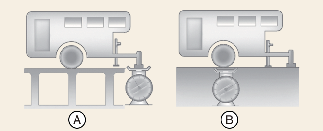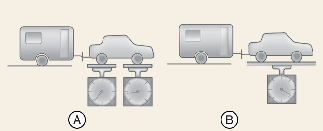If you do decide to pull a trailer
Here are some important points if you decide to pull a trailer:
-
Consider using a sway control. You can ask a hitch dealer about sway control.
-
Do not do any towing with your vehicle during its first 1,200 miles (2,000 km) in order to allow the engine to properly break in. Failure to heed this caution may result in serious engine or transmission damage.
-
When towing a trailer, be sure to consult an authorized Kia dealer for further information on additional requirements such as a towing kit, etc.
-
Always drive your vehicle at a moderate speed (less than 60 mph (100 km/h)).
-
On a long uphill grade, do not exceed 45 mph (70 km/h) or the posted towing speed limit, whichever is lower.
-
The chart contains important considerations that have to do with weight:
Item
(Gasoline) 3.8 GDi
lbs. (kg)
Maximum trailer weight
Without brake system
1,650 (750)
With brake system (Type A)
5,000 (2,268)
With brake system (Type B)
5,500 (2,495)
Maximum tongue weight
500 (227)
To identify what the vehicle trailering capacity is for your vehicle, you should read the information in More Details.
-
For X-PRO Trim (equipped with all-terrain 18” tire), you need to increase the rear tire pressure when towing a trailer for steering stability.
Inflation Pressure
Normal
Towing
Front
35 psi
35 psi
Rear
35 psi
40 psi
* For recommended inflation pressure, refer to More Details.
Weight of the trailer

A: Tongue Load
B: Total Trailer Weight
What is the maximum safe weight of a trailer? It should never weigh more than the maximum trailer weight with trailer brakes. But even that can be too heavy.
It depends on how you plan to use your trailer. For example, speed, altitude, road grades, outside temperature and how often your vehicle is used to pull a trailer are all important. The ideal trailer weight can also depend on any special equipment that you have on your vehicle.

A: Gross Axle Weight
B: Gross Vehicle Weight
The tongue load of any trailer is an important weight to measure because it affects the total Gross Vehicle Weight (GVW) of your vehicle. This weight includes the curb weight of the vehicle, any cargo you may carry in it, and the people who will be riding in the vehicle. And if you will tow a trailer, you must add the tongue load to the GVW because your vehicle will also be carrying that weight.
After you've loaded your trailer, weigh the trailer and then the tongue, separately, to see if the weights are proper. If they aren't, you may be able to correct them simply by moving some items around in the trailer.

Trailer
Always follow the loading instructions provided with your trailer. Improper loading can effect vehicle operation and result in an accident.